人教版(2019)选择性必修 第四册Unit 5 Launching Your Career Using Language Listening and Speaking课件(共24 张,内嵌音频)
文档属性
| 名称 | 人教版(2019)选择性必修 第四册Unit 5 Launching Your Career Using Language Listening and Speaking课件(共24 张,内嵌音频) |
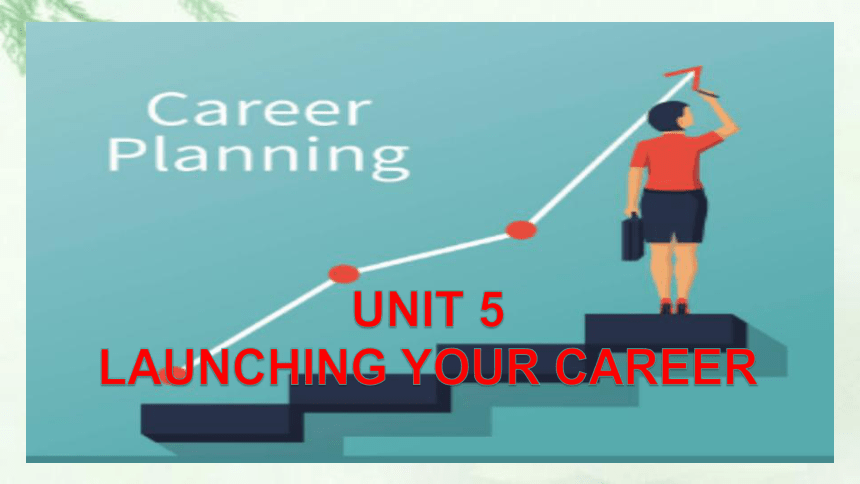
|
|
| 格式 | pptx | ||
| 文件大小 | 33.9MB | ||
| 资源类型 | 教案 | ||
| 版本资源 | 人教版(2019) | ||
| 科目 | 英语 | ||
| 更新时间 | 2025-02-19 00:00:00 | ||
图片预览


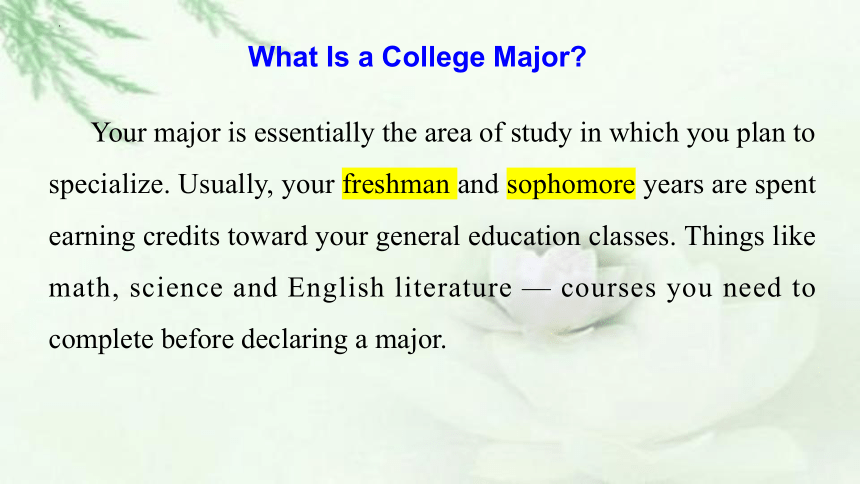
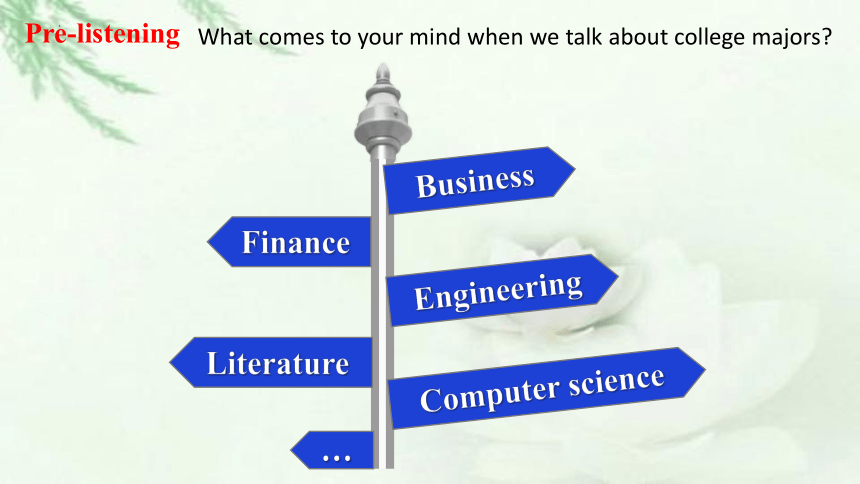
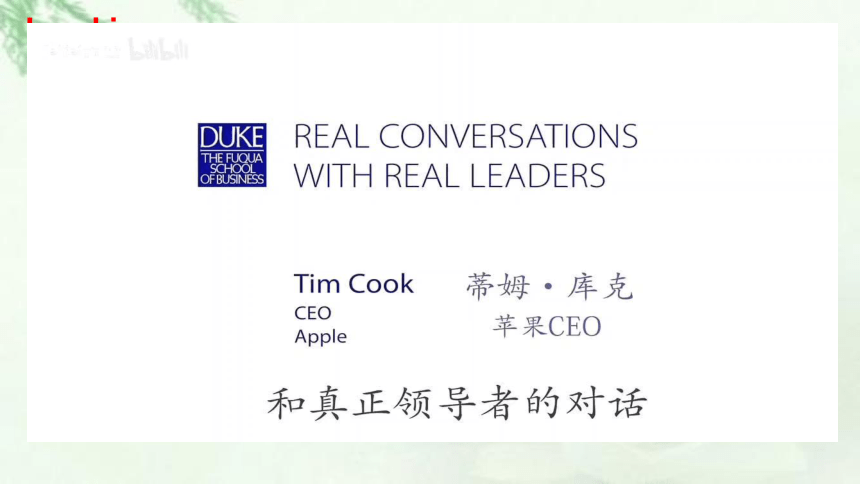


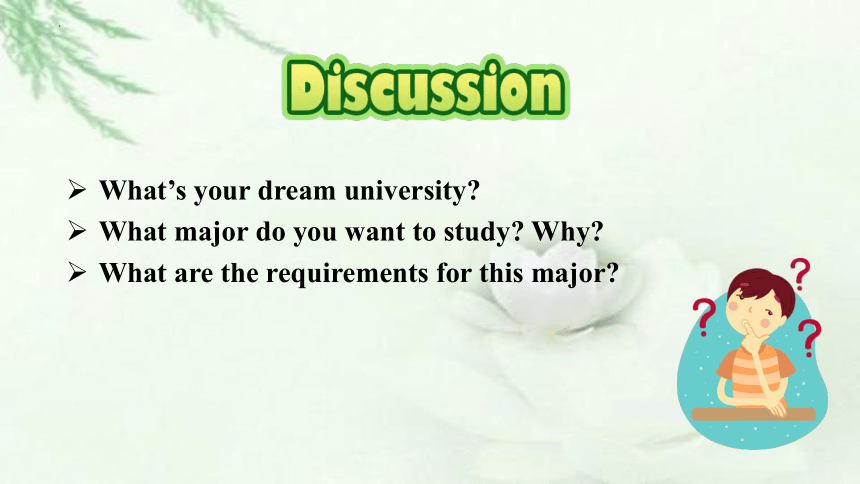
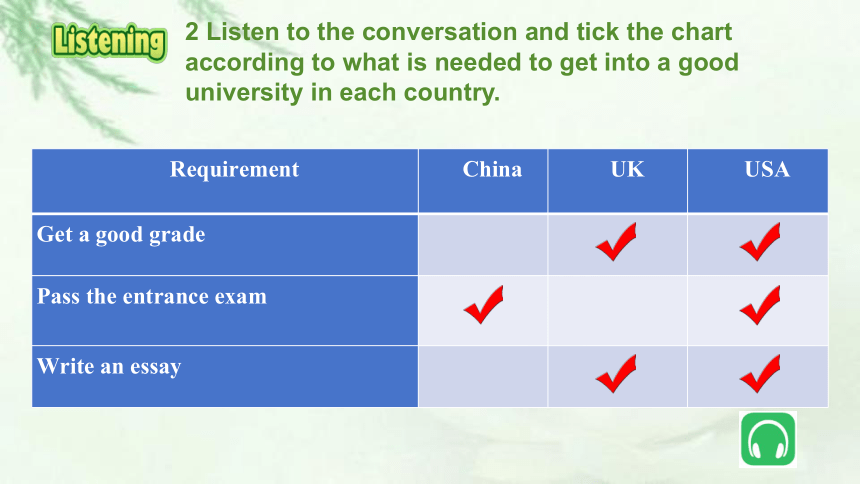
文档简介
(共24张PPT)
UNIT 5
LAUNCHING YOUR CAREER
Choose a university major
What Is a College Major
Your major is essentially the area of study in which you plan to specialize. Usually, your freshman and sophomore years are spent earning credits toward your general education classes. Things like math, science and English literature — courses you need to complete before declaring a major.
What comes to your mind when we talk about college majors
Pre-listening
Business
Finance
Engineering
Literature
Computer science
…
Lead in
1 Look at the pictures below. Discuss in pairs which university major each picture might show.
Bio-medical engineering ______
Computer game design ______
Cyber security ______ Data science ______
Public health ______ Robotics ______
Do you know these university majors
Genetic engineering (基因工程)
Renewable energy management
(可再生能源管理)
Emerging media studies (新兴媒体研究)
Blockchain technology (区块链技术)
What’s your dream university
What major do you want to study Why
What are the requirements for this major
2 Listen to the conversation and tick the chart according to what is needed to get into a good university in each country.
Requirement China UK USA
Get a good grade
Pass the entrance exam
Write an essay
3 Listen to the conversation again, and take notes on what each student would like to study and why.
Student Chosen major Reason
Liu Ming
Susan
Olivia
Computer game design
to design fun games for children to learn with
International business
to find work overseas and see more of the world
Robotics
interested in futuristic things
1. What did Liu Ming say about cybersecurity and data science
2. What did Susan say she was told
3. What did Olivia say they need to do to get into good universities
4 Listen again and answer the questions below.
LM: How about cybersecurity or data science I read that _______________ _____________________________________________________ But I’m hopeless at programming!
S:That’s a good point. I was told ___________________________________
______________________________________.
O:Yes, and don’t forget that where you study is also important, too. I’m planning on taking a few campus tours to see what the atmosphere and facilities are like.
LM:Good idea! I really hope that we can all find good universities.
S:Me,too. I hope we are all lucky and find great universities.
O:Luck Ha-ha! I think we all need to _____________________________
fascinating subjects if you’re good at computer programming.
that you like but you’re not very good at
start studying even harder, too!
they’re really
that there’s no point choosing a subject
1. What did Liu Ming say about cybersecurity and data science
2. What did Susan say she was told
3. What did Olivia say they need to do to get into good universities
Identify references
When we speak, we often refer to someone else’s opinion or what we have heard, read, or been told. When expressing this in speech, we use phrases such as I heard/read that. . . , according to. . . , I was told that. . . , etc.
Listen again and answer the questions below.
1 He said that they’re really fascinating subjects if you’re good at computer programming.
2 She was told that there’s no point in choosing a subject that you like but you’re not very good at.
3 According to Olivia, they need to start studying even harder.
Summary: factors that influence our major choices
hobbies
interests
social responsibility
passion
strengths/
weaknesses
career
development
people’s
opinions
(counselor )
(A Venn diagram)
Discuss these questions.
1 Do you agree with Olivia’s parents when they say that a person’s career might depend on what university they get into Why or why not
It depends upon the career. For a few highly specialised careers, getting into the right university is key. For many other careers, it does not matter which university you have been to, or even really what you have studied at university.
2 Do you agree that there is no point studying something that you like but you are not very good at Give your reasons.
Yes, because it serves no purpose. I might like listening to the piano and dream of being a concert pianist, but if I lack the talent, what is the point
6 Read the expressions below and put them into different categories. Then have a group discussion and add more to each category.
I’d choose …because … If possible, I’d really like to… I’m not sure if that suits you, because ... I think that is really difficult because… I think you are really suited to that because … That’s a good choice, but I think you should ... Are you sure that’s a good choice Have you thought about ...
I’m not sure what I want to study yet, but right now I’m thinking about … because …
I plan/hope/wish to …
My goal/dream is to ...
I’ve always wanted to …
Expressing choices, wishes, intentions, and opinions
Choice I’d choose …because …
If possible, I’d really like to…
… is always my first choice.
I prefer …to …
I choose… in preference to…
I give priority to…
Wish I plan/hope/wish to …
My goal/dream is to ...
I’ve always wanted to …
I dream of/about …
I simply can’t wait to…
I’m longing to…
I’m eager for…
Intention I’m not sure what I want to study yet, but right now I’m thinking about …
I intended to…
I’d like to… with the intention of…
I attempt to…
Opinion I’m not sure if that suits you, because ...
I think that is really difficult because…
I think you are really suited to that because …
That’s a good choice, but I think you should ...
Are you sure that’s a good choice Have you thought about ...
In my opinion, …
From my perspective, …
Personally, …
According to..., …
In pairs, tell each other about the major(s) you would like to choose. Use the expressions below to help you.
Discuss the questions in Activity 5 with your partner.
Make a list of the factors that would influence your career choice.
Tell your partner about the major(s) you would like to choose using the expressions and the reasons.
Report your partner’s choice using the expressions of making reference.
6 Read the expressions below and put them into different categories. Then have a group discussion and add more to each category.
I’d choose …because … If possible, I’d really like to… I’m not sure if that suits you, because ... I think that is really difficult because… I think you are really suited to that because … That’s a good choice, but I think you should ... Are you sure that’s a good choice Have you thought about ...
I’m not sure what I want to study yet, but right now I’m thinking about … because …
I plan/hope/wish to …
My goal/dream is to ...
I’ve always wanted to …
Expressing choices, wishes, intentions, and opinions
A: What major will you choose in university
B: I’m not really sure yet. My goal is to work at a large company, so I guess Business administration.
A: Are you sure that’s a good choice Most of the people I know who are working at large companies majored in something else. And a lot of companies want employees with different education backgrounds, as they have different skills and points of view.
B: So, what would you suggest
A: Have you thought about history You love that subject.
B: That’s a good choice, but I still think I should study something more useful for my future career. What about you What major will you choose
A: I plan to study nutrition and child health after I go to medical school.
B: So, you want to be a doctor
A: Yes, if possible, I’d really like to become a pediatrician.
B: Wow! I think that might be quite difficult for you. Your grades in science have been weak so far.
A: That might be true, but it is my dream. I’ll study harder when it comes to science from now on.
B: What if it doesn’t work out
A: Well, I’ll just have to cross that bridge when I come to it.
Express your opinions.
Find a recent news story about choosing university majors. Share the story in class.
Give comments on the choice the person/people made in groups.
Share your comments in class using the following useful expressions.
As is shown in the new story, …
From the news story, we can tell that …
Personally, I appreciate …
I am against…
My reasons are as follows …
It’s natural to choose… However, …
Summary
In this lesson, we have:
1. Learned about some emerging (newly started) and popular university majors;
2. Listened and identified the factors that would influence our major choices;
3. Talked about our preferred majors and the reasons for our preference.
Interview one of your family members or friends, talking about his or her choice of university majors.
Thank you!
UNIT 5
LAUNCHING YOUR CAREER
Choose a university major
What Is a College Major
Your major is essentially the area of study in which you plan to specialize. Usually, your freshman and sophomore years are spent earning credits toward your general education classes. Things like math, science and English literature — courses you need to complete before declaring a major.
What comes to your mind when we talk about college majors
Pre-listening
Business
Finance
Engineering
Literature
Computer science
…
Lead in
1 Look at the pictures below. Discuss in pairs which university major each picture might show.
Bio-medical engineering ______
Computer game design ______
Cyber security ______ Data science ______
Public health ______ Robotics ______
Do you know these university majors
Genetic engineering (基因工程)
Renewable energy management
(可再生能源管理)
Emerging media studies (新兴媒体研究)
Blockchain technology (区块链技术)
What’s your dream university
What major do you want to study Why
What are the requirements for this major
2 Listen to the conversation and tick the chart according to what is needed to get into a good university in each country.
Requirement China UK USA
Get a good grade
Pass the entrance exam
Write an essay
3 Listen to the conversation again, and take notes on what each student would like to study and why.
Student Chosen major Reason
Liu Ming
Susan
Olivia
Computer game design
to design fun games for children to learn with
International business
to find work overseas and see more of the world
Robotics
interested in futuristic things
1. What did Liu Ming say about cybersecurity and data science
2. What did Susan say she was told
3. What did Olivia say they need to do to get into good universities
4 Listen again and answer the questions below.
LM: How about cybersecurity or data science I read that _______________ _____________________________________________________ But I’m hopeless at programming!
S:That’s a good point. I was told ___________________________________
______________________________________.
O:Yes, and don’t forget that where you study is also important, too. I’m planning on taking a few campus tours to see what the atmosphere and facilities are like.
LM:Good idea! I really hope that we can all find good universities.
S:Me,too. I hope we are all lucky and find great universities.
O:Luck Ha-ha! I think we all need to _____________________________
fascinating subjects if you’re good at computer programming.
that you like but you’re not very good at
start studying even harder, too!
they’re really
that there’s no point choosing a subject
1. What did Liu Ming say about cybersecurity and data science
2. What did Susan say she was told
3. What did Olivia say they need to do to get into good universities
Identify references
When we speak, we often refer to someone else’s opinion or what we have heard, read, or been told. When expressing this in speech, we use phrases such as I heard/read that. . . , according to. . . , I was told that. . . , etc.
Listen again and answer the questions below.
1 He said that they’re really fascinating subjects if you’re good at computer programming.
2 She was told that there’s no point in choosing a subject that you like but you’re not very good at.
3 According to Olivia, they need to start studying even harder.
Summary: factors that influence our major choices
hobbies
interests
social responsibility
passion
strengths/
weaknesses
career
development
people’s
opinions
(counselor )
(A Venn diagram)
Discuss these questions.
1 Do you agree with Olivia’s parents when they say that a person’s career might depend on what university they get into Why or why not
It depends upon the career. For a few highly specialised careers, getting into the right university is key. For many other careers, it does not matter which university you have been to, or even really what you have studied at university.
2 Do you agree that there is no point studying something that you like but you are not very good at Give your reasons.
Yes, because it serves no purpose. I might like listening to the piano and dream of being a concert pianist, but if I lack the talent, what is the point
6 Read the expressions below and put them into different categories. Then have a group discussion and add more to each category.
I’d choose …because … If possible, I’d really like to… I’m not sure if that suits you, because ... I think that is really difficult because… I think you are really suited to that because … That’s a good choice, but I think you should ... Are you sure that’s a good choice Have you thought about ...
I’m not sure what I want to study yet, but right now I’m thinking about … because …
I plan/hope/wish to …
My goal/dream is to ...
I’ve always wanted to …
Expressing choices, wishes, intentions, and opinions
Choice I’d choose …because …
If possible, I’d really like to…
… is always my first choice.
I prefer …to …
I choose… in preference to…
I give priority to…
Wish I plan/hope/wish to …
My goal/dream is to ...
I’ve always wanted to …
I dream of/about …
I simply can’t wait to…
I’m longing to…
I’m eager for…
Intention I’m not sure what I want to study yet, but right now I’m thinking about …
I intended to…
I’d like to… with the intention of…
I attempt to…
Opinion I’m not sure if that suits you, because ...
I think that is really difficult because…
I think you are really suited to that because …
That’s a good choice, but I think you should ...
Are you sure that’s a good choice Have you thought about ...
In my opinion, …
From my perspective, …
Personally, …
According to..., …
In pairs, tell each other about the major(s) you would like to choose. Use the expressions below to help you.
Discuss the questions in Activity 5 with your partner.
Make a list of the factors that would influence your career choice.
Tell your partner about the major(s) you would like to choose using the expressions and the reasons.
Report your partner’s choice using the expressions of making reference.
6 Read the expressions below and put them into different categories. Then have a group discussion and add more to each category.
I’d choose …because … If possible, I’d really like to… I’m not sure if that suits you, because ... I think that is really difficult because… I think you are really suited to that because … That’s a good choice, but I think you should ... Are you sure that’s a good choice Have you thought about ...
I’m not sure what I want to study yet, but right now I’m thinking about … because …
I plan/hope/wish to …
My goal/dream is to ...
I’ve always wanted to …
Expressing choices, wishes, intentions, and opinions
A: What major will you choose in university
B: I’m not really sure yet. My goal is to work at a large company, so I guess Business administration.
A: Are you sure that’s a good choice Most of the people I know who are working at large companies majored in something else. And a lot of companies want employees with different education backgrounds, as they have different skills and points of view.
B: So, what would you suggest
A: Have you thought about history You love that subject.
B: That’s a good choice, but I still think I should study something more useful for my future career. What about you What major will you choose
A: I plan to study nutrition and child health after I go to medical school.
B: So, you want to be a doctor
A: Yes, if possible, I’d really like to become a pediatrician.
B: Wow! I think that might be quite difficult for you. Your grades in science have been weak so far.
A: That might be true, but it is my dream. I’ll study harder when it comes to science from now on.
B: What if it doesn’t work out
A: Well, I’ll just have to cross that bridge when I come to it.
Express your opinions.
Find a recent news story about choosing university majors. Share the story in class.
Give comments on the choice the person/people made in groups.
Share your comments in class using the following useful expressions.
As is shown in the new story, …
From the news story, we can tell that …
Personally, I appreciate …
I am against…
My reasons are as follows …
It’s natural to choose… However, …
Summary
In this lesson, we have:
1. Learned about some emerging (newly started) and popular university majors;
2. Listened and identified the factors that would influence our major choices;
3. Talked about our preferred majors and the reasons for our preference.
Interview one of your family members or friends, talking about his or her choice of university majors.
Thank you!
